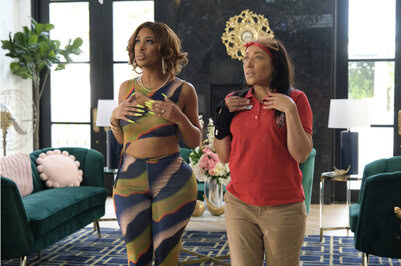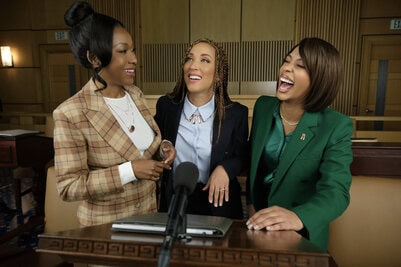The creator and showrunner of HBO’s A Black Lady Sketch Show spoke with Boardroom about the show’s title and creating a space for Black women to be funny and real.
What do you get when you combine knee-slapping sketch comedy, the Black female lens, and a team filled with award-winning writers, directors, and executive producers? A Black lady sketch show.
No, seriously, that’s what it’s called.
Created by the namesake star of BET’s former late-night talk show The Rundown with Robin Thede, A Black Lady Sketch Show features the comedy stylings, puns, and wit of rising Black female leads including DaMya Gurley, Tamara Jade, Skye Townsend, Gabrielle Dennis, Angel Laketa Moore, and Thede herself. Executive produced by Issa Rae’s HOORAE Media, the show has created its stamp on the entertainment industry as the first sketch comedy series on television to be written by, directed by, and star Black women.

Keeping it close in the Warner Bros. Discovery family, the creator and star of A Black Lady Sketch Show recently inked a three-year overall deal last year following a similar one she signed in 2020 with Warner Bros. Television. In creating content exclusively for HBO, Max, and Warner platforms, Thede has continued to deliver satisfying hits to fans — and on April 14, A Black Lady Sketch Show returns once again.
Ahead of the show’s fourth season premiere, Boardroom had the opportunity to speak with Robin Thede about creating an Emmy Award-winning space for funny Black women to reckon with their lived experiences, how she and her team lean on humor as a path to joy in the industry, and her hopes for the future of sketch comedy.
D’SHONDA BROWN: What was the inspiration behind the show and specifically the bold title of A Black Lady Sketch Show?
ROBIN THEDE: The creation was because I’d been doing a bunch of sketch shows my whole life and this was always my dream. I’d been doing “Black Lady Sketch Shows” live at Second City and a bunch of places for many, many years, but the name was just because I don’t want people to be surprised when they tuned in. If we called it the All-American Sketch Show and they tuned in and only saw Black people, they would be like, ‘what is this?‘ I wanted to get that out of the way so people could just enjoy the comedy.

DB: Oftentimes, we as Black women are pigeonholed into the role of the funny best friend or the comic relief. How are you leaning into comedy to provide a safe space and give ownership to Black women?
RT: By hiring Black women in positions of power.
We are the ones writing the material. We’re the ones creating the material and women of color [are] producing the entire show. For me, it’s just about saying, ‘Hey, you’re welcome here and you’re not gonna be underestimated and we’re gonna support you. All of your opinions are valid and whatever’s funniest wins.’ I think being in a workplace where you don’t have to explain who you are before you can do what you do is utterly invaluable.
DB: How do you balance being one of the stars of the show while also managing being an EP and showrunner?
RT: I don’t — I work all the time. You’re like, ‘How do you have balance in your life?‘ I’m like, ‘Oh, I don’t.’ Let’s be clear. I don’t; I just do what I need to do until action is called and then I perform and I go back to all the other jobs.
They all work part and parcel of each other because they all work together because I created the show out of my mind. I knew what I wanted it to look like. I knew how I wanted it to be run. I knew how I wanted it to be staffed. I knew how I wanted to write sketches and I knew how I wanted to perform on it. For me, it’s all part of the same job.
DB: You mentioned that you make a point of hiring and giving space to Black women. What does the term “lift as you climb” mean to you, and how have you been practicing it with Black women throughout the duration of your career?
RT: I think it’s really important to provide space for people who look like you so that you can all work together to create greatness. I think that so many times the talent is not lacking, the opportunity is lacking. For so many Black women who have been working so hard for so long, we just don’t have those opportunities.

There are plenty of Black women before me and who will come after me who could have created A Black Lady Sketch Show, but I was the one who was prepared and ready and presented with the opportunity at the time. That’s not to say there aren’t a million more — there certainly are, and I think that the great thing about lifting as you climb is saying, ‘Well, I’m not gonna be the only one who to do this.’ I’m gonna train the second one to do it, or I’m gonna invite the second one to do it who’s already ready.
I don’t even think of it as climbing anymore because I feel like I’ve reached success that I could’ve never even seen for myself. I just see it as growth, you know? I see it as being able to say I get to expand when other people come with me and we all expand together. It’s really the same, but “climbing” makes it sound like there are people under me or people I’m stepping on to get there. For me, it’s about growing and expanding outwardly, not up or down because the business is a rollercoaster. You can always be on the downside of things, but if you continue to grow and to widen out, then I think your arms can just embrace more and more and more.
DB: How do you lean on comedy as a means of joy for Black women in this world and how do you continue to encourage others in your camp to do so?
RT: You know what’s funny? I don’t even have to encourage ’em, we just come to work so happy to be there. I mean, I think for any Black woman, if you get to work on A Black Lady Sketch Show, you’re like, ‘Oh my God, like this is great.’ I definitely don’t have to teach them that; they come with the joy and I’m just responding. I’m mirroring the joy back to them.
People were like, ‘Oh, you set a good example ’cause you’re so joyful,’ and I’m like, ‘No, I’m thrilled to be working with them.’ My cast, my crew in front of [and] behind the camera, my writers, my editors — it’s just so amazing to see Black women doing this at the highest, Emmy Award-winning level. My director, Bridget [Stokes], [and] my editors have won twice. We have 13 nominations and three wins and it’s just so incredible to me to watch that, to see that history being made, and that example and that door staying open for those who come behind us.

DB: What do you hope for the future of Black women in comedy and sketch and variety shows to look like?
RT: I think it should look like whatever we want it to look like. I hope that we named it “A” Black Lady Sketch Show ’cause I don’t want it to be the Black Lady sketch show; we have opportunities to create beyond anything that’s on television now.
I just want us to keep growing and to be able to have limitless opportunities to tell our stories authentically. What’s critical is that a lot of people wanna put us in front of the camera now in some roles, but they still don’t hire people who look like us to write for us and I think we clock that when we’re watching programming and it doesn’t feel authentic.
DB: How would you say that the scene of comedy and sketch shows has evolved over the years, specifically regarding DEI efforts?
RT: I don’t know. I’m not a corporation. I don’t have diversity or inclusion stats. All I know is that Sketch Show is providing a place where Black women can come and do their best work authentically. If that’s a role model to anyone else, then great but the world of sketch comedy has historically been very white and very male. Obviously, I saw a hole that I could fill. I think that’s been one of the greatest joys of the show is that Black women are now equated with sketch comedy, whereas we might not have been before.

DB: What is something that the world doesn’t know about you and your work that you’d want folks to recognize?
RT: I just want the world to show up and watch A Black Lady Sketch Show. I think everybody knows how much I love this show and how much I love this cast, my writers, my director of my editors, [and] my crew. If they don’t, they definitely should know that because this show is made from love and from joy and it’s silly and it’s reckless and it’s ruthless and it’s wild and it’s raunchy.
At the end of the day, we want it to feel like a gift not only to the Black women who we make it for, but also all the audiences who watch it and who get to see an authentic point of view that’s rarely found on television.